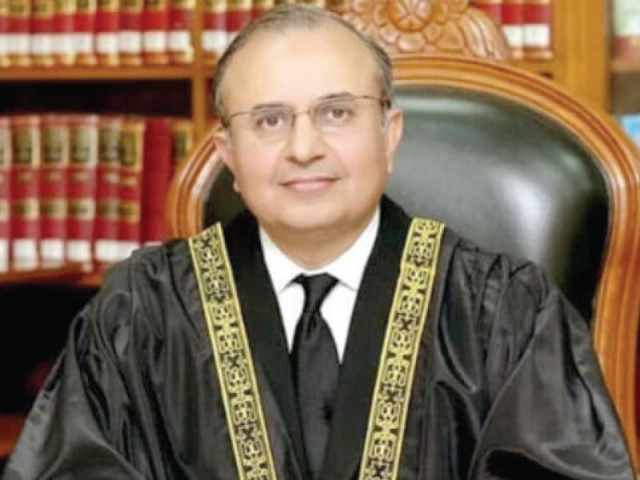Justice Shah puts Chief Justice Afridi in a tight spot
Legal experts, lawyers endorse demands made by SC senior puisne judge in a recent letter

Once again Justice Syed Mansoor Ali Shah has put Chief Justice of Pakistan (CJ) Yahya Afridi to the test by urging him to convene a full court for hearing the petitions filed against the 26th Constitutional Amendment.
Justice Shah, who is known to be a close associate of CJ Afridi, is consistently asking him for the listing of petitions challenging the amendment, which has increased the influence of executive in the affairs of judiciary
As member of the SC's three-member committee, the SC's senior puisne judge and Justice Munib Akhtar had even ordered listing the petitions for hearing on November 4 but the registrar did not comply with the order.
However, on November 5, CJ Afridi did convene the first meeting of the reconstituted Judicial Commission of Pakistan (JCP) to consider nominations of judges for the Supreme Court's Constitutional Bench (CB), mandated to be formed under the 26th amendment.
CJ Afridi wanted all SC judges to be included in the CB but the government due to its additional members in the newly formed JCP successfully managed the situation and selected seven SC judges for the CB, by overlooking three SC senior judges.
A lawyer said CJ Afridi is consistent in his approach. He mostly agrees with Justice Shah's views on issues during JCP meetings but he does not assert others to follow his opinion.
"However, it is a fact that despite Justice Shah's request, he did not convene a full court for the adjudication of 26th Constitutional Amendment pleas.
"Now it will be interesting to see whether or not CJ Afridi endorses Justice Shah's demand that the JCP rules should be framed first before considering nominations for appointing additional judges.
A senior government official agreed that Justice Shah's demand for making JCP rules is absolutely genuine.
Commenting on Justice Shah's letter, Abdul Moiz Jaferii Advocate said the most crucial observations of Justice Shah are that the authority to assemble the full court still rests with the CJ even after the 26th amendment and that the newly formed JCP is mandated to compile its rules of procedure, which includes the setting out of the process to appoint judges.
Justice Shah then observes how nothing can be implied into the Constitution and hence this rule making process must first be completed before judges are to be considered.
He said the CBs in the SC and the Sindh High Court have been formed in an absolutely arbitrary manner and these violations are troubling.
The All Pakistan Lawyers Action Committee for Restoration of Constitutional Rule and the Independence of Judiciary has also unequivocally endorsed the stance taken by Justice Mansoor Ali Shah in his letter.
"This letter highlights critical constitutional violations stemming from the fraudulent and illegal passage of the 26th Constitutional Amendment, which has undermined judicial independence and trampled upon the foundational principles of Pakistan's Constitution.
"Justice Mansoor Ali Shah has raised substantial concerns regarding the restructuring of the JCP under the controversial amendment.
"The 26th Amendment has sought to make the judiciary subservient to the executive by usurping its role in judicial appointments, case listing, and formation of benches.
"This unconstitutional maneuver threatens the very foundation of the principle of trichotomy of powers and the basic structure of the Constitution, as clearly enshrined in its preamble and Article 175A."
The statement said the All Pakistan Lawyers Action Committee, along with a broad coalition of senior advocates, constitutional experts, and bar associations from across the country, firmly stands with Justice Mansoor Ali Shah in opposing these illegal steps that jeopardize the independence of the judiciary.
"These esteemed leaders, alongside other members of the legal fraternity, unanimously condemn the executive's blatant attempt to divide and weaken the judiciary through unconstitutional means."
The statement, highlighting the core concerns, said the 26th amendment compromises the judiciary's autonomy by giving the executive undue influence over judicial appointments, case management, and bench formation.
"The amendment is in direct conflict with the Constitution's principles of trichotomy of powers and its preamble, which explicitly establishes the judiciary as an independent pillar of the Federation.
"The amendment undermines the foundational tenet of judicial independence enshrined in Article 175A and the Constitution's basic structure doctrine.'
It said the manner in which the 26th Amendment was passed raises serious concerns about its legitimacy, legality, and adherence to constitutional procedures.
The committee urged for immediate actions to restore constitutional rule and preserve the independence of the judiciary.
It said the Supreme Court must convene a full court to hear the petitions challenging the 26th Constitutional Amendment and decide the matter on merit.
A lawyer, however, disagreed with the view that the petitions against 26th Constitutional Amendment should be listed before a full court right now.
He said at present, the executive will easily manage a majority to endorse the 26th Constitutional Amendment.
"The next three months are crucial. The CB is already controversial. Lawyers should give it some more time. The situation will get worse. The strategy should be to make this new set up more controversial.
"Let the petitions be heard by the CB. It will have no legitimacy. But full court's endorsement will give the CB and the 26 amendment legitimacy," he added.



















COMMENTS
Comments are moderated and generally will be posted if they are on-topic and not abusive.
For more information, please see our Comments FAQ